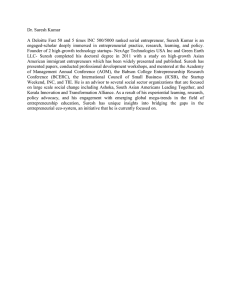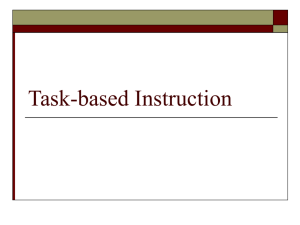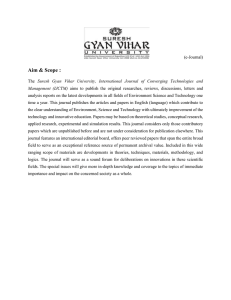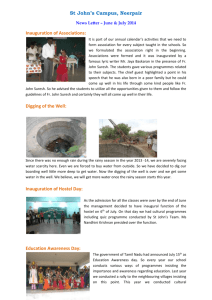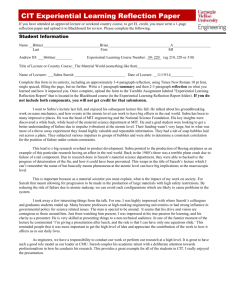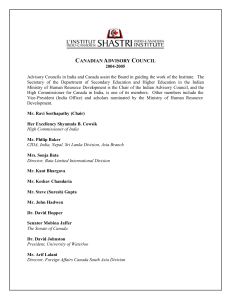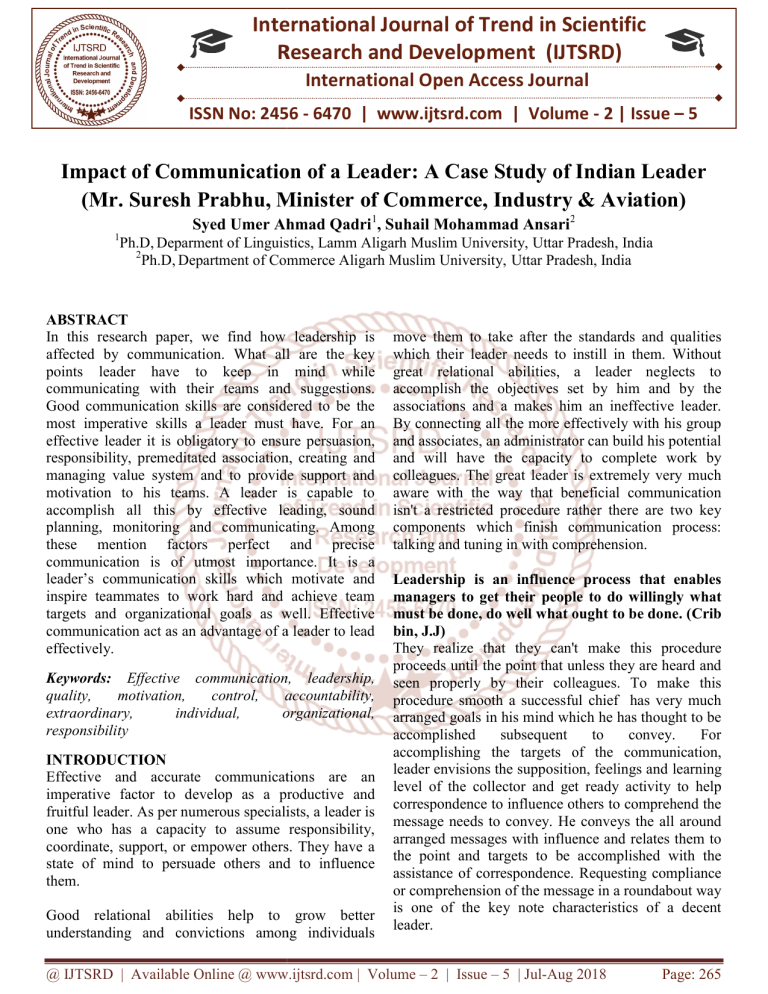
International Journal of Trend in Scientific
Research and Development (IJTSRD)
International Open Access Journal
ISSN No: 2456 - 6470 | www.ijtsrd.com | Volume - 2 | Issue – 5
Impact of Communication of a Leader: A Case Study off Indian Leader
(Mr. Suresh Prabhu, Minister of Commerce, Industry & Aviation)
1
Syed Umer Ahmad Qadri1, Suhail Mohammad Ansari2
Ph.D, Deparment off Linguistics, Lamm Aligarh Muslim University, Uttar Pradesh,
Pradesh India
2
Ph.D, Department off Commerce Aligarh Muslim University, Uttar Pradesh, India
ABSTRACT
In this research paper, we find how leadership is
affected by communication. What all are the key
points leader have to keep in mind while
communicating with their teams and suggestions.
Good communication skills are considered to be the
most imperative skills a leader must have. For an
effective leader it is obligatory to ensure persuasion,
responsibility, premeditated association, creating and
managing value system and to provide support and
motivation to his teams. A leader is capable to
accomplish all this by effective leading, sound
planning, monitoring and communicating. Among
these mention factors perfect and precise
communication is of utmost importance. It is a
leader’s communication skills which motivate and
inspire teammates to work hard and achieve team
targets and organizational goals as well. Effective
communication act as an advantage of a leader to lead
effectively.
Keywords: Effective
fective communication, leadership,
quality,
motivation,
control,
accountability,
extraordinary,
individual,
organizational,
responsibility
INTRODUCTION
Effective and accurate communication
communications are an
imperative factor to develop as a productive and
fruitful leader.
eader. As per numerous specialists, a leader is
one who has a capacity to assume responsibility,
coordinate, support, or empower others. They have a
state of mind to persuade others and to influence
them.
Good relational abilities help to grow better
understanding and convictions among individuals
move them to take after the standards and qualities
which their leader needs to instill in them. Without
great relational abilities, a leader neglects to
accomplish the objectives set by him and by the
associations
ations and a makes him an ineffective leader.
By connecting all the more effectively with his group
and associates, an administrator can build his potential
and will have the capacity to complete work by
colleagues. The great leader is extremely very much
aware with the way that beneficial communication
isn't a restricted procedure rather there are two key
components which finish communication process:
talking and tuning in with comprehension.
Leadership is an influence process that enables
managers to get their people to do willingly what
must be done, do well what ought to be done. (Crib
(
bin, J.J)
They realize that they can't make this procedure
proceeds until the point that unless they are heard and
seen properly by their colleagues. To make this
procedure
re smooth a successful chief has very much
arranged goals in his mind which he has thought to be
accomplished
subsequent
to
convey.
For
accomplishing the targets of the communication,
leader envisions the supposition, feelings and learning
level of the collector
llector and get ready activity to help
correspondence to influence others to comprehend the
message needs to convey. He conveys the all around
arranged messages with influence and relates them to
the point and targets to be accomplished with the
assistance of correspondence. Requesting compliance
or comprehension of the message in a roundabout way
is one of the key note characteristics of a decent
leader.
@ IJTSRD | Available Online @ www.ijtsrd.com | Volume – 2 | Issue – 5 | Jul-Aug 2018
Page: 265
International Journal of Trend in Scientific Research and Development (IJTSRD) ISSN: 2456-6470
Leadership is interpersonal influence, exercised in
a situation, and directed, through the
communication process, toward the attainment of
a specified goal or goals. (Tannenbaum, Weschler
& Massarik)
Asking for confirmation or understanding of the
message indirectly is one of the key note qualities of a
good leader. While receiving any message, he keeps
all his doors open and try to figure out the main idea.
Even in case of negative feedback he doesn’t lose his
heart and take it as an opportunity to learn new things.
He always tries to understand the weak points and
analyses the usefulness of the communication. In case
of miss-communication taking corrective measure to
rectify the mistake is also important and must be done
by the managers or leaders. Hence, to establish
oneself as a great and effective leader one must be an
effective convincing communicator and needs to learn
skilfully the art of extraordinary communication, this
would further support manager and his team to attain
new levels of quality leadership. Ethos is also acting
as an important aspect of effective leadership. It is
must for a leader to be sensitive towards moral
ideologies.
The objectives of the research paper:
The main objectives of this research paper are as
follows:
To explore communication elan of the Indian
leader
To find out the quality of the Indian leader.
To identify the relationship of the Indian leader
with office secretariats and peoples.
To find out the ability of the Indian leader.
To identify the impact of the Indian leader on
peoples.
To identify the challenges involved with Indian
leader
To find out the management skills of the Indian
leader
Leader communication is characterized as motivating
and empowering an individual or a gathering by
precise and important sharing of data by utilizing
phenomenal
relational
abilities.
Initiate
communication is a perplexing procedure which
begins with creating a methodology for importing,
composing correctly and after that talking adequately
to control troublesome circumstances. Authority
communication has three noteworthy angles: Core,
Managerial, and corporate. With an expansion in
leader's portfolio there is a need to extemporize
relational abilities to oversee huge skyline also, to end
up significantly more compelling every single
conceivable circumstance. Leaders can build up a
culture of trust and can undoubtedly assemble
relationship with representatives and different
business channels that encourage associations to
develop all the more quickly. Put stock in building
exercises incorporates correspondence administration,
sourcing the privilege systems, positive discussion
about what else to be done and criticism of the
communication. Trust is basic since it is the trust of
the general population that has the ability to make a
tremendous frame slight and change over major into
minor. Consequently, it is must for a hierarchical
leader to ensure that the general population, related
with them contain confidential in factor.
Few opinions of scholars about Mr. Suresh Prabhu
as;
Akram Azad (PRESIDENT AT AASRA THE
FOUNDATION, NGO BAHRAICH) opines that he
is a leader with futuristic vision for the country and
for his peoples.
DATA ASSORTMENT:
The material studied in this paper was extracted from
the internet, social sites, and one thousand two
hundred people’s opinions from three different states
like Maharashtra, Uttar-Pradesh and Delhi, telephonic
conversations with his personal assistant and his
social media assistant and observations.
Pallav Vishnu, (Guest faculty, AMU); opines that he
has the ability to judge people's very fast. This is the
unique quality finds in very few leaders.
Danish Rahim (scholar) said that he is very down to
earth and has vision for development through his
power. He uses his power in development of the
country. I saw his development policy on the internet,
either as a minister of railway or minister of
commerce, industry and civil aviation is excellent.
Irfan Ahmad (PDF in Sanskrit department) opines
that he is very honest and hard working leader. He is
most responsible leader than others.
Syed Afzal Ali, (Research fellow from Gonda) opines
that he is a non controversial figure in spite of that
every leader in same party wants consideration
through negative politics.
@ IJTSRD | Available Online @ www.ijtsrd.com | Volume – 2 | Issue – 5 | Jul-Aug 2018
Page: 266
International Journal of Trend in Scientific Research and Development (IJTSRD) ISSN: 2456-6470
Mohd. Rehan, (Research scholar from Moradabad)
opines that he is honest and non controversial leader
in Indian politics. He has ability to manage the crucial
situation through his knowledge and experience.
Tanveer Ahmad (business man from Mumbai) said
that he is a leader with many qualities like speaker,
managing ability.
Parvez Ahmad (form Delhi) opines that he has unique
governing style in running the ministry by his caliber.
RESEARCH METHOD:
In this research paper the qualitative research methods
are used to find out the quality of a leader.
We planned a communication program through
appointment with Mr. Suresh Prabhu in his office.
The aims of this research paper are to explore the
quality of a leader.
This research paper aims are to gain insights into
Mr. Suresh Prabhu’s lifestyle, culture, behavior,
and preferences.
Tompkins and Cheney’s organizational control
theory is an extension of Weberian theory applied to
organizations that are moving past the bureaucratic
mode but are yet to be totally amorphous. This theory
holds that there are four kinds of control that
determine how organizations exercise power within
and they are simple, technical, and bureaucratic. In a
way, these four types of control are defined according
to the progression of the organization from very
simple organizational models to pure bureaucracies to
overly technical and finally an organization where
everyone knows what is expected of him or her and
has the purpose of the organization’s mission and
vision clearly etched within them. The point here is
that Tompkins and Cheney posit a model where
control and communication is more than what Weber
had envisaged and less than what postmodern
theorists say about organizational control and
communication.
Leadership elan Influencing Communication;
Mr. Suresh Prabhu is concerned with the practice and
use of diverse leadership elan under unlike situations
according to the need of audiences and personal
leadership qualities. Under every situation the
communication gets affected as some situations
demand direct and strict communication and in other
situation he opts for indirect ways of communication.
Stroke Based Leader
Mr. Suresh Prabhu gives an emphasis to these points;
assignment, group and individual. He concentrates on
the assignment given, the team working on that
assignment and individual issues of the team members
and should try to meet the deadlines by focusing on
each one at different times. Here, the main drive of
the team is to get the work done and he upholds the
focus of the team to achieve objectives
Aim Orientated Leader;
Mr. Suresh Prabhu has a vision or goal for him and
for his team. This vision or goals are synchronized
with organizational aims and objectives. He
communicates the vision and goals for his team so as
to motivate them to achieve them with efficiency. He
communicates in a way so that he will be able to
make others see what he is expecting from them.
Team involvement, effective listening, clear and
timely communication is the main feature of his style.
Directional Leadership Elan:
Mr. Suresh Prabhu helps his teams to achieve their
personal work targets and team targets by telling them
the appropriate methods and showing the right
directions to achieve those goals. He acts as a
director, who support and enables his team to follow
the path which leads them to achieve their goals more
easily and perfectly by communicating effectively.
Leadership Elan According to the Intellectual
Level:
Mr. Suresh Prabhu adjusts his leadership elan by
keeping in mind the intellectual level and maturity of
the employees. Here maturity does not refer to the
sensitivity or age, but it means work stability,
tendency to handle complex situations, potential of
achieving given target. Effective leaders always try to
maintain a good balance by adjusting the leadership
method which further has an influence on
communication.
Behavioral Leadership Elan:
Mr. Suresh Prabhu distinguishes his leadership in two
ways; one is a work-orientated and the other one is
individual orientated. Accomplishment, inspiration,
readiness and aptitude to take accountability, the
leanings and knowledge regulate the blend of his
style. This leadership elan does not depend on so
many ways, but it hinges on the situation, where and
why it has to be used. The consequence of this style is
that during communication, associations must have
@ IJTSRD | Available Online @ www.ijtsrd.com | Volume – 2 | Issue – 5 | Jul-Aug 2018
Page: 267
International Journal of Trend in Scientific Research and Development (IJTSRD) ISSN: 2456-6470
sufficient consideration to make the interaction a
successful one.
Analysis of questions and answer session hours in
parliament:
Context
Venue
Purpose
Remark
Mr.
Parliament Information; The peoples
Suresh
He provides of
the
Prabhu
information country as
Question
related to his well
the
&
work done leader who
Answer
in railway asked
session.
development questions to
.
Mr. Suresh
Prabhu
satisfied.
The above analysis shows the quality of Mr. Suresh
Prabhu. He has a capacity to assume responsibility,
coordinate, support, or empower others. They have a
state of mind to persuade others and to influence
them. He has mastered at controlling hard to
troublesome conditions.
FINDINGS:
Mr. Suresh Prabhu is best communicator.
He is icon of intelligence and wisdom.
He knows very well how to deal in crucial
situations.
He has administrative skills.
He has a future vision for the work which is
related to him or his ministry.
His relational abilities help him to grow better
understanding and conviction among individuals
and groups.
He is very much concerned with the practice and
use of diverse leadership elan.
He has a great quality to connecting all the more
effectively with his group, associates, and
individuals.
He has the competences to motivate team to
achieve which seems to be impossible for others.
His communication skills make him effective who
develops better understanding in teams.
He has the ability to build up a culture of trust and
can undoubtedly assemble relationship with
representatives and different business channels
that encourage associations to develop all the
more quickly.
When he receives any message, he keeps all his
doors open and try to figure out the main idea.
CONCLUSION:
In this research analysis, we find these qualities
should be in leader. A leader cannot become an
effective leader until unless he is an excellent
communicator and must use his ability to let
individuals follows him. He must have knowledge and
will be able to communicate that knowledge to others
at work. A leader must have the competences to
motivate team to achieve which seems to be
impossible for others. Communication makes a leader
effective who develops better understanding in teams.
These understanding bring a sense of trust in
employees on the leader and on each other, work
together, which further reinforce congenial relations
with team members and creates an excellent work
atmosphere. While working with such a good,
healthy, positive and congenial environment they get
motivated and enthusiastic to work much harder. In
some of the style like where the leader has to handle a
tough or critical situation he need to be little hard and
leadership elan will become authoritative, but must
have a control on his communication otherwise it may
become a miss-communication or an ineffective one.
In another example where has to deal with a group
with different work attitude and elan, here he needs to
be more people centric and should communicate in a
way that he will be able to communicate at individual
levels even while interacting with a group.
REFERENCES:
1. Adair, J. (2003). Effective Communication. In J.
Adair, Effective Communication. landon: London:
Pan Macmillan Ltd.
2. Capone, A. (nov-2016). The Pragmatics of
Indirect
Reports:
Socio-philosophical
Considerations. In A. Capone, The Pragmatics of
Indirect
Reports:
Socio-philosophical
Considerations (p. 364). Springer International
Publishing.
3. collins, p. (1977). Speak with Power. In p. collin,
Speak with Power. New York: Pocketbooks.
4. Crystal, D. (2006). Language and internet; The
Pragmatics Encyclopedia. In D. Crystal, Lanhuage
and internet; The Pragmatics Encyclopedia (p.
234). Cam bridge university press.
5. fairclough, N. (1989). Language and power.
newyork: long man .
6. KenHyland. (ctober 1998 October 1998).
Persuasion and context: The pragmatics of
@ IJTSRD | Available Online @ www.ijtsrd.com | Volume – 2 | Issue – 5 | Jul-Aug 2018
Page: 268
International Journal of Trend in Scientific Research and Development (IJTSRD) ISSN: 2456-6470
academic met discourse. Journal of Pragmatics,
437=456.
7. Morris, C. W. (1970). The Pragmatic Movement
in American Philosophy. In C. W. Morris, The
Pragmatic Movement in American Philosophy (p.
210). George Braziller.
8. qadri, s. u. (april-2018). A discourse analysis of
PM Modi's speech on swach bharat abhiyan.
Journal of emerging technologies and innovative
research, 673-677.
9. qadri, s. u. (2018). A linguistics analysis of
jawaharlal Nehru's tryst with destiny speech.
Language in india, 327-337.
10. qadri, s. u. (2017). indian slogans: A semiocommunicative analysis. Interdisciplinary journal
of linguistics, 207-210.
11. Cribbin, J.J. ‘Leadership:
organizational effectiveness’
@ IJTSRD | Available Online @ www.ijtsrd.com | Volume – 2 | Issue – 5 | Jul-Aug 2018
strategies
for
Page: 269

